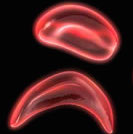 A team of physicians and researchers from the University of California, Berkeley, the University of Utah, and the University of California, San Francisco, have published the results of a new study that reports on an important discovery that may be an important breakthrough in efforts to find a cure for sickle cell disease.
A team of physicians and researchers from the University of California, Berkeley, the University of Utah, and the University of California, San Francisco, have published the results of a new study that reports on an important discovery that may be an important breakthrough in efforts to find a cure for sickle cell disease.
Sickle cell disease affects about 100,000 people in the United States. The disease, inherited from both parents, causes some of the patient’s red blood cells, normally shaped like a saucer, to take on a crescent or sickle shape. These malformed cells are less effective at their primary job, conveying oxygen from the lungs to the rest of the body. The cells also clump together, blocking circulation and leading to organ damage, strokes and episodes of intense pain, called vaso-occlusive crises. While people of any race can have the sickle-cell trait, the disease is far more common among African Americans than it is among Whites. About one in every 400 African Americans is born with the sickle-cell trait.
Scientists have used gene editing to fix the mutated gene responsible for the disease in stem cells from the blood of affected patients. They have corrected the mutation in a significant proportion of stem cells that is high enough to produce a substantial benefit to people who have sickle cell disease. In tests with mice, the genetically engineered stem cells remained for at least four months after transplantation.
Jacob Corn, an author of the study and the scientific director of the Innovative Genomics Initiative at Berkeley, stated that “there is still a lot of work to be done before this approach might be used in the clinic, but we’re hopeful that it will pave the way for new kinds of treatment for patients with sickle cell disease.”
The study, “Selection-Free Genome Editing of the Sickle Mutation in Human Adult Hematopoietic Stem/Progenitor Cells,” was published in the October 12 issue of Science Translational Medicine. It may be accessed here.












